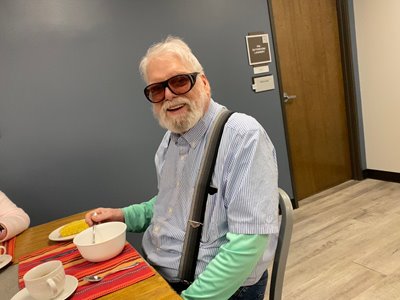"I didn't know what I needed."
.jpg?width=2016&height=1512&ext=.jpg)
At age 28, once-successful guitarist Richard Johnson found himself strung out on alcohol and drugs and playing in bars and honky-tonks for $50 a night.
Music had always been part of Richard's life. "I was a solo act and opened for stars like Bonnie Raitt, John Prine, and Robert Klein. It was all great fun, but like others in show business, I drank and drugged out,” Richard explained.
On New Year's Eve, 1979, he went out to get drunk, but no matter how much he drank, he couldn't get buzzed. About a month later, he walked into an open church hosting an Alcoholics Anonymous meeting, was reintroduced to God, and got sober.
While performing in church one Sunday, he met a man who told him about prison ministry, primarily for the addicted. That meeting, coupled with the process of his own recovery, prepared Richard for a new career as an ordained prison minister dealing with people suffering from all forms of addiction.
For 10 years, Richard's ministry took him, his wife Dawn, and their two children across the US and Canada, visiting prisons and counseling inmates with addiction issues.
They finally put down roots in Jeffersonville, IN, and continued to work with substance abusers and their families.
Life was good. Then, Richard noticed some vision issues. The diagnosis was dry retinitus pigmentosa.
Music had always been part of Richard's life. "I was a solo act and opened for stars like Bonnie Raitt, John Prine, and Robert Klein. It was all great fun, but like others in show business, I drank and drugged out,” Richard explained.
On New Year's Eve, 1979, he went out to get drunk, but no matter how much he drank, he couldn't get buzzed. About a month later, he walked into an open church hosting an Alcoholics Anonymous meeting, was reintroduced to God, and got sober.
While performing in church one Sunday, he met a man who told him about prison ministry, primarily for the addicted. That meeting, coupled with the process of his own recovery, prepared Richard for a new career as an ordained prison minister dealing with people suffering from all forms of addiction.
For 10 years, Richard's ministry took him, his wife Dawn, and their two children across the US and Canada, visiting prisons and counseling inmates with addiction issues.
They finally put down roots in Jeffersonville, IN, and continued to work with substance abusers and their families.
Life was good. Then, Richard noticed some vision issues. The diagnosis was dry retinitus pigmentosa.
Why me?
Anyone who has lost their vision asks the same question. For Richard, who had lived a life of service to others, it was particularly poignant. He had counseled, cried, and argued with thousands of lost souls who were struggling with addiction and its fallout, only to find himself wondering why God dealt him this hand.
He lost his enthusiasm - his joy for life. He had to rely on others for things he used to do without thinking. He was depressed, and like many, Richard had given up.
About five years later, he heard about Bosma through Indiana's Vocational Rehabilitation program.
"When Richard came in that first day, I knew he had given up, but he was willing to be honest and transparent. He gave it all he had, which is the key to success," Michelle Shaffer, Bosma's Adjustment Counselor, said.
Michelle listened closely as he unfolded his story of drinking and drug addiction and how it led to his counseling of addicts and their families. When she told him the statistics for substance abuse are particularly high in those who are blind or visually impaired*, the light came on for Richard.
During his 16-week course at Bosma, he found people quietly approaching him, wanting to talk about their issues with alcohol and drugs.
“I knew there was another reason I was here. I was an alcoholic, and I am blind. Maybe this was my why me," he said.
Richard plans to return to Bosma regularly to continue his mission and talk with those who are blind and suffering from substance abuse.
Commit fully
“At age 73, the technology represented a steep learning curve – computers, iPhones, specialized devices - but I was all in. My favorite part of training was Orientation and Mobility. I liked the challenge. Honestly, it was fun and liberating.
Now, I can sit at the computer, write my books, and type like a “real” person. And the instructors are incredible: knowledgeable, patient, and kind,” he said.
Richard's words to others? “Bosma will change your life. It provides a sense of community and relieves your feelings of isolation and anxiety. “Don't wait - just do it!"
| *National statistics show that alcohol and/or drug abuse is 2-4 times higher in those who are blind, than in the general population. ----------------------------------------------------------------------------------------------- Richard Johnson has written four books on the topic of drug and alcohol abuse and recovery and started a non-profit called Kerith’s Family Recovery (www.noonerecoversalone.org), focusing primarily on the families of prisoners who are addicted. |